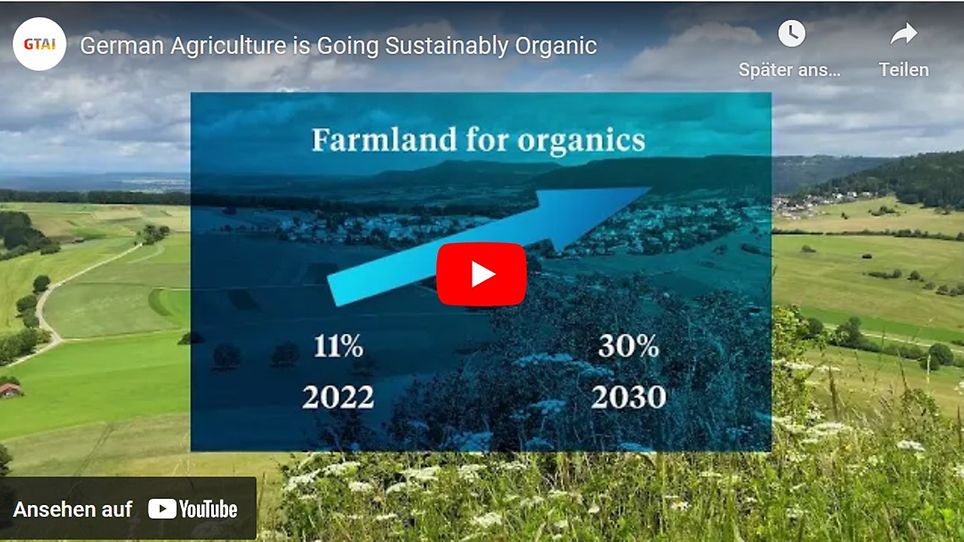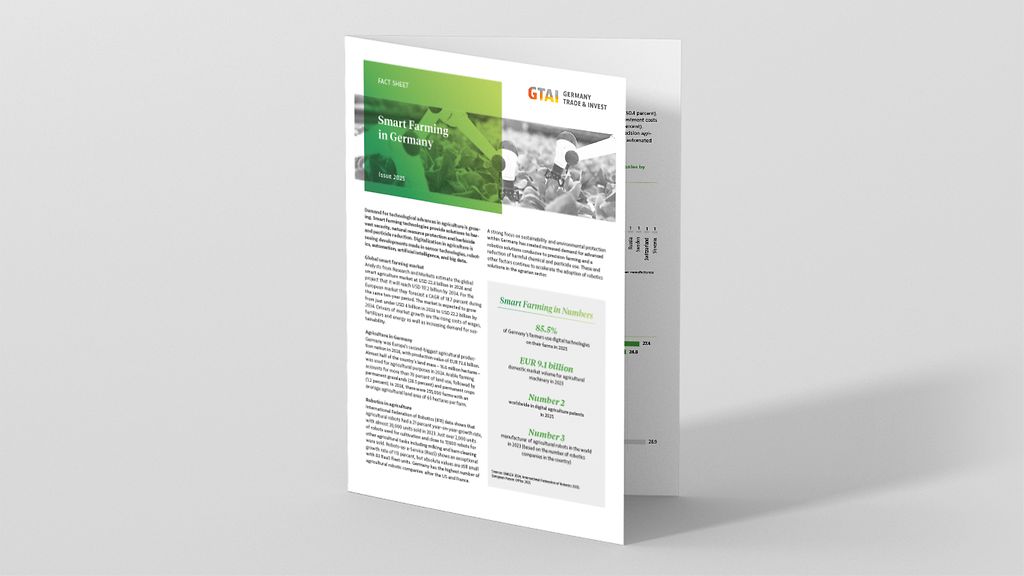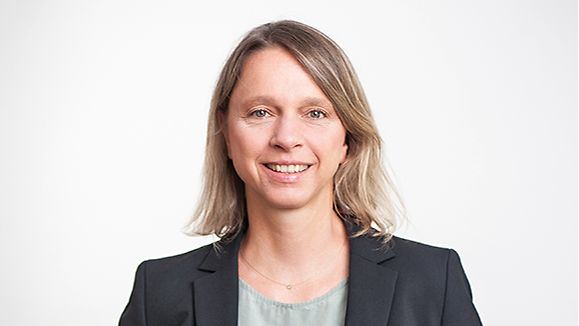turnover for agricultural technology in 2023 in Germany
Your company is already operating in Germany and you would now like to export worldwide?
Key Facts
The Smart Farming Industry in Numbers
- The global smart farming market value is forecast to rise from USD 22.4 billion in 2024 to USD 117.2 billion by 2034.
- According to a study conducted in 2024/25 by the Federal Ministry of Agriculture, Food and Regional Identity (BMLEH), 85.5 percent of respondents use digital technologies on their farms and 9.1 percent plan to invest in new digital technologies within the next 12 months.
- In 2024, around EUR 4.8 billion turnover was generated in German domestic production of agricultural and forestry machinery. Foreign sales amounted to almost EUR 10 billion.
- International Federation of Robotics (IFR) data shows that agricultural robots had a 21 percent year-on-year-growth rate – with almost 20,000 units sold in 2023. After the US and France, Germany has the highest number of agricultural robotic companies.
- Agriculture in Germany is undergoing a structural transformation. The absolute number of farms and labor force has fallen as agricultural product demand has increased. In 2024, Germany was Europe’s second-biggest agricultural production nation with production value of more than EUR 73 billion.
- Nearly half – 16.6 million hectares – of domestic land mass is used for agricultural purposes. Arable farming accounts for over 70 percent of land used. Livestock husbandry is focused in the areas of beef, pork and poultry production.
Opportunities
Germany provides a plethora of exciting market opportunities to companies active in the field of digital agriculture.
Agricultural machinery manufacturers meet digital product and service providers
Germany is the world’s third biggest producer of agricultural machinery - EUR 4.8 billion was generated in German domestic production in 2024. Agricultural machinery manufacturers are diversifying into autonomous farming, alternative powertrains and ICT solutions that require cooperation with digital product and service providers.
Commercializing autonomous field robots
In 2023, almost 2,000 robot units for the cultivation of plants and crops were sold worldwide – equivalent to an annual increase of two percent. The number of marketable products is growing but it still requires some pioneering spirit and funding for farmers to use robots in the field. More popular still are robots for agricultural tasks including milking and barn cleaning. Close to 17,600 robots (24 percent increase) were sold in 2023.
Artificial intelligence and software
The implementation of AI and software precision-farming solutions fees up resources and improves product quality. The BMWE-funded network “DeepFarmBots – AI-based agricultural robotics for efficient and sustainable agriculture” aims to create new products, processes and services for the use of agricultural robots.
On the investment agenda: Precision farming
Precision farming – including site-specific management of fertilization, plant protection, application maps, and spot spraying – is currently high on the investment agenda of companies in the sector according to a recent BMLEH study.
Digital solutions for organic farming
Germany is Europe’s largest organic food market. European Union and German federal regulations restrict the use of herbicides and promote the use of sustainable livestock husbandry. Demand for organic and sustainably farmed produce creates new opportunities for companies providing digital solutions.
Business Environment
Research & Development
Germany’s world-class R&D institutes and universities are helping shape the future of smart farming. Working closely with industry and the farming community, institutes like Fraunhofer-Gesellschaft and Leibniz Association are bringing innovations to market. The three federal research institutes – Julius Kühn Institut, Thünen Institut and Friedrich-Löffler-Institut – also conduct research in the field of smart farming and the Federal Ministry of Food and Agriculture is supporting 14 digital trial fields up to 2025 to help research digital techniques for crop production and animal husbandry as well as to test their practical suitability. The knowledge from the experimental fields is bundled at www.farmwissen.de and freely available. The German Research Center for Artificial Intelligence investigates the use of AI in agriculture.
Funding options
Germany supports digitalization in agriculture through a number of initiatives and programs. Specialized R&D funding programs have been created to promote the development of digital agriculture technologies. Research and development programs can provide up to 70 percent of eligible costs subject to company size and area of research activity.
Clusters and industry associations
International companies active in the digital farming sector enjoy ready access to agricultural technology clusters where farmers, machinery manufacturers, agritech start-ups, universities, and research institutes work together. Stakeholders are organized in regional networks including the Agrotech Valley in northwestern Germany, Agronym in Saxony, and Competence Network Digital Agriculture Bavaria in Bavaria.
Our smart farming map provides you with an overview of important actors across Germany:





